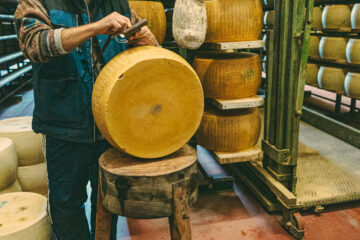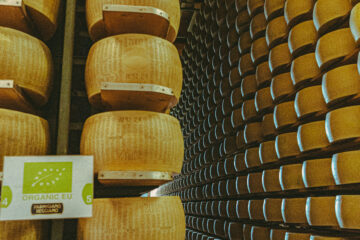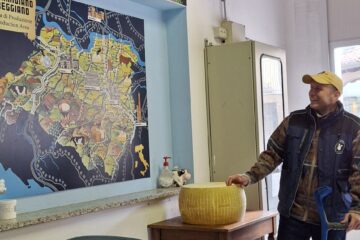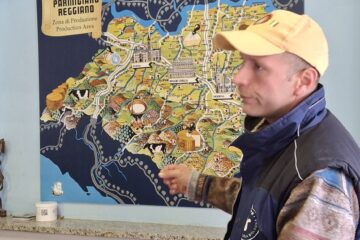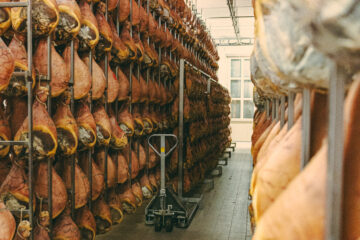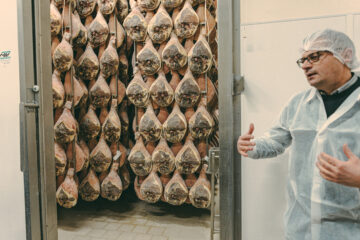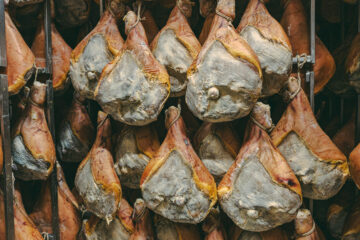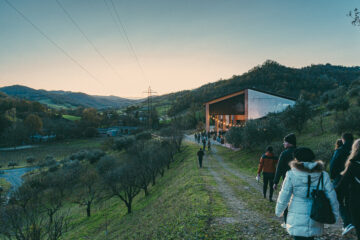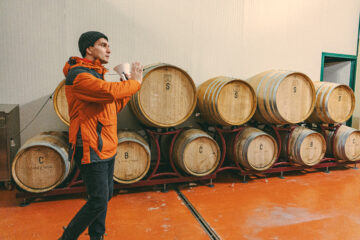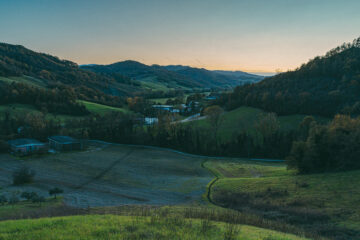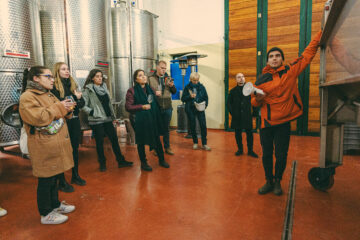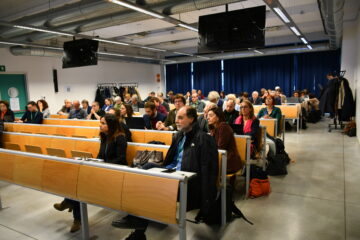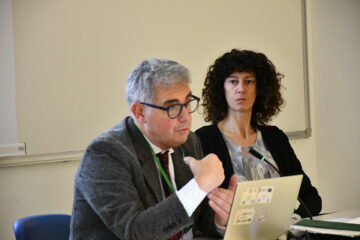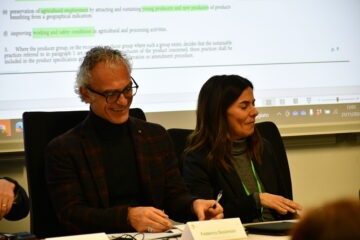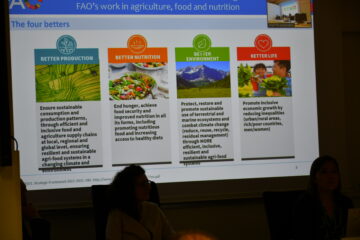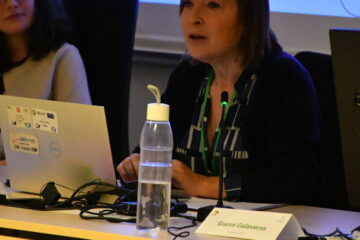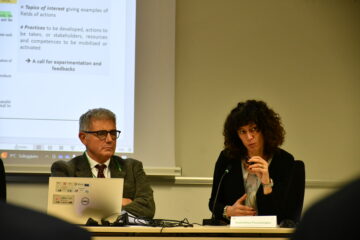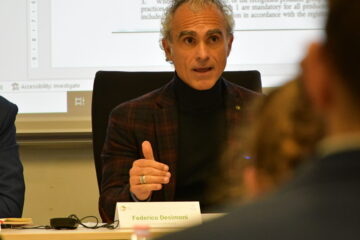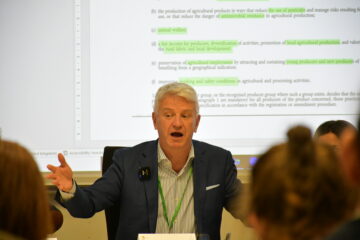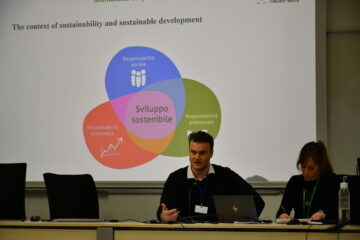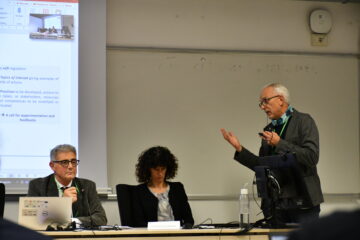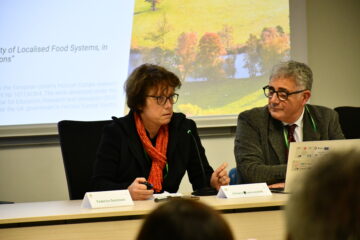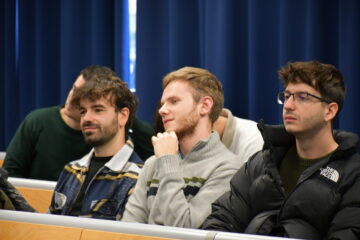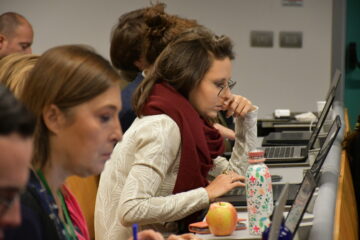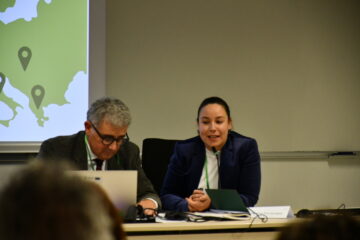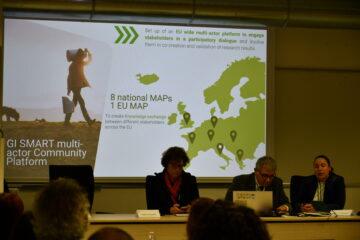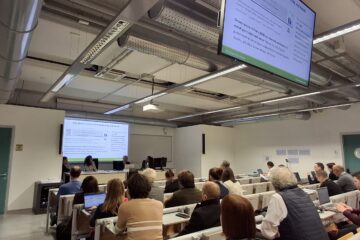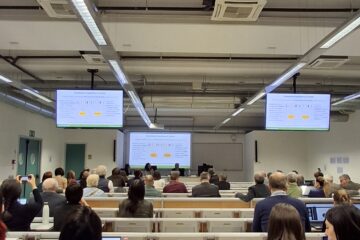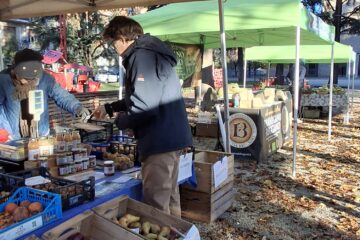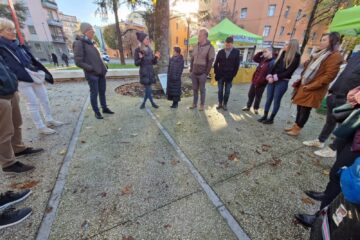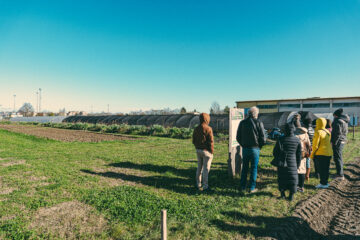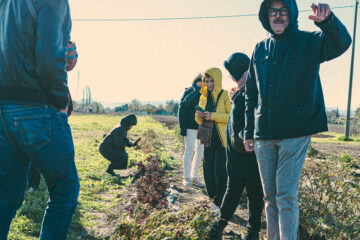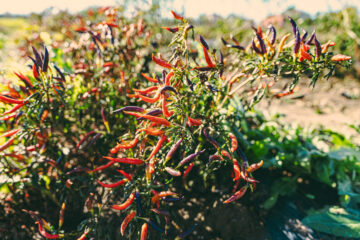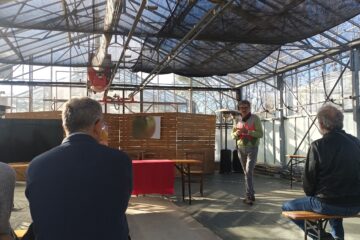International Conference Parma 2024
The Role of Origin in the Sustainability of localised Food Systems
in particular, the role of circular economy in Geographical Indications
University of Parma, Italy
20 – 22 November 2024

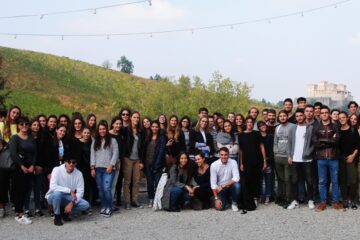
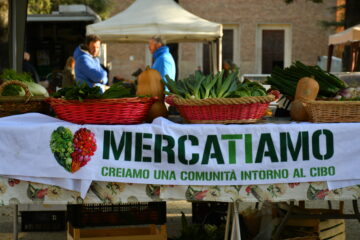
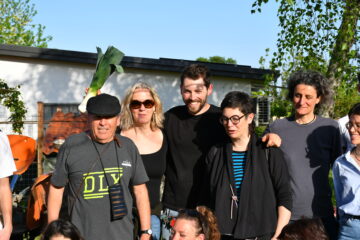
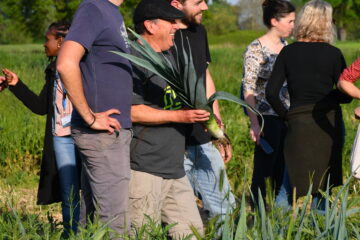
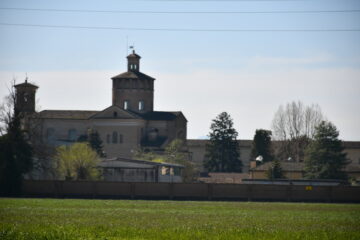
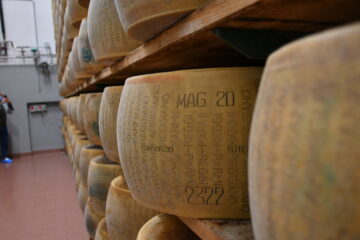
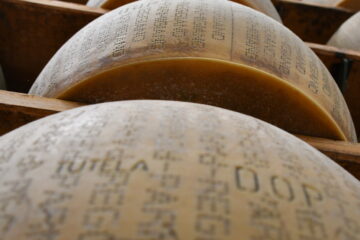
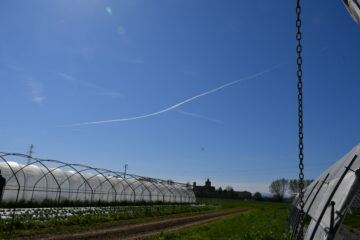
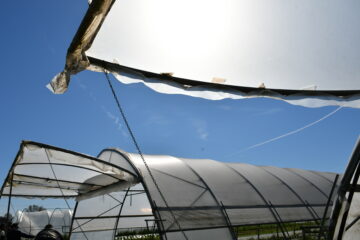
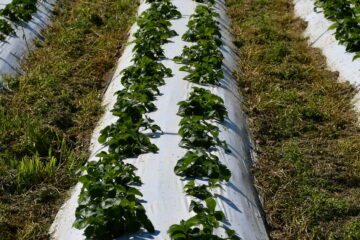
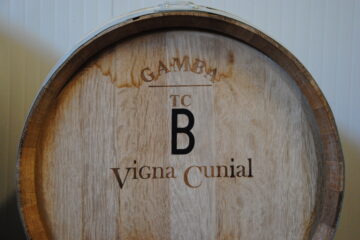
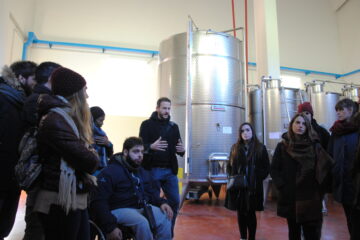

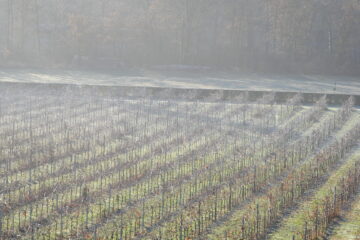
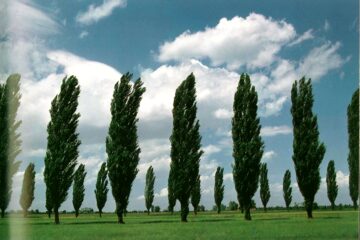
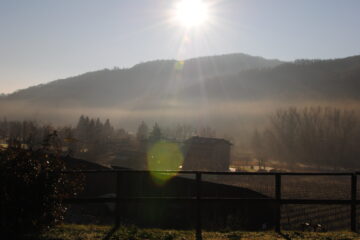
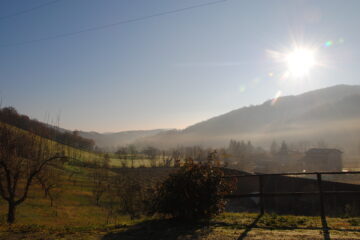
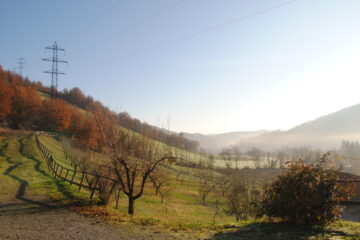
International conference on the role of origin and Geographical Indications (GIs) in sustainable food systems
Organised by Origin for Sustainability and the University of Parma.

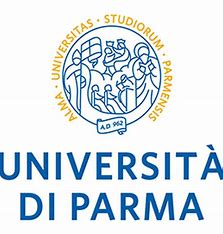
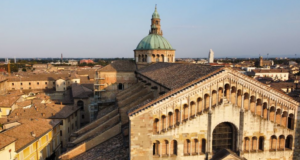
About the International Conference 2024
The issue of sustainable food systems is gaining momentum, especially with COP28 unveiling ambitious strategies. Key focuses include nutrition, emission reduction, and adapting agricultural practices to enhance food production sustainably. Geographical indications play a significant role in this, showcasing strengths and spearheading various initiatives like energy conservation, waste recycling, promoting circular economy principles, and adopting agroecological practices. Innovations such as enhanced labelling and marketing strategies aim to raise consumer awareness and support sustainable production.
GIs are tools that are recognized to contribute to the economic welfare of their region of origin. They coexist with alternative options that boost the market access and the economic return to the local farmers and food producers. The objective of this international conference is to share different experiences and scientific work about the way sustainability improvement is occuring in the regions where origin is a marker of the identity of the products and is a tool which is mobilised by the local communities to reach out the consumers through direct marketing or long chains, combining with remarkable landscapes, tourism and daily life of the community.
Through interactive sessions, policy dialogues, and stakeholder engagements, we aspire to catalyze actionable strategies and foster a collective commitment towards building resilient, equitable, and sustainable agrifood systems that meet the challenges of today and tomorrow.
The International Conference on Sustainability and Food Systems brought together a distinguished lineup of speakers, each representing a wealth of expertise and diverse perspectives from across Europe and beyond. Their backgrounds in academia, policymaking, industry, and international organizations enriched the discussions, offering a holistic view of the role of Geographical Indications (GIs) and sustainable food systems in promoting biodiversity, social equity, and economic resilience.
François Casabianca
Affiliated with Origin for Sustainability, François Casabianca presented the Conference Introduction, his experience in the ethical and social dimensions of GIs brought a nuanced understanding of the role of inclusivity and equity in food systems.
François Casabianca Parma Conference Introduction Presentation
Mamen Cuéllar Padilla
From the Universidad de Córdoba, Spain, Mamen Cuéllar Padilla advocates for participatory systems in sustainable agriculture. Her deep engagement with grassroots movements and localized farming communities in Europe and Latin America set the stage for discussions on building sustainability from the ground up.
Mamen Cuellar Padilla Plenary 1 presentation
Gianni Galaverna
Based at the Università di Parma, Italy, Gianni Galaverna brings cutting-edge research in food science to the forefront. Hailing from the heart of the Emilia-Romagna region, renowned for its culinary heritage, he provided an academic perspective on biodiversity and nutritional stability.
Gianni Galaverna Plenary 1 presentation
Beatrice Biasini
Also from the Università di Parma, Italy, Beatrice Biasini’s focus on nutritional and health dimensions of food production is deeply tied to the region’s expertise in high-quality GI products like Parmigiano Reggiano and Prosciutto di Parma. Her work bridges scientific analysis with practical dietary implications.
Beatrice Biasini Plenary 1 presentation
Valérie Pieprzownik
Representing the Food and Agriculture Organization (FAO), Valérie Pieprzownik offered a global perspective rooted in FAO’s extensive work on sustainable agri-food systems. Based in Rome, Italy, her insights spanned international best practices and policy frameworks.
Valérie Pieprzownik Plenary 1 Presentation
Chiara Piancastelli
A Prosciutto di Parma DOP GI Group member, Chiara Piancastelli brings experience from Parma, Italy, a global hub for renowned GIs. Her contributions reflected the consortium’s innovative approaches to circular practices and sustainability in traditional food production.
Valentina Pizzamiglio
From the Parmigiano Reggiano DOP GI Group, Italy, Valentina Pizzamiglio’s presentation highlighted the environmental stewardship and governance practices embedded in one of the most iconic GIs worldwide, Parmigiano Reggiano.
Federico Desimoni
Hailing from the Aceto Balsamico DOP GI Group, Italy, Federico Desimoni shared insights from Modena, the birthplace of traditional balsamic vinegar. His expertise in managing GI governance and sustainability practices added depth to discussions on territorial authenticity.
Luca Giavi
As director of the Consorzio del Prosecco DOC GI Group, Italy, Luca Giavi brought a Venetian perspective to the conference. His focus on sustainable viticulture and branding showcased the intersection of tradition and innovation in global wine markets.
Armelle Mazé
From INRAE, France, Armelle Mazé presented the GI SMART project and offered a strategic view of how academia and policy can converge to enhance sustainability.
Francesca Alampi
Representing AREPO, a partner from the GI SMART project, Francesca Alampi works from Brussels, Belgium.
Armelle Mazé and Francesca Alampi’s GI SMART presentation
Nicola dall’Olio
Representing Region Emilia-Romagna in Brussels, Belgium, Nicola dall’Olio brought policy expertise directly linked to the European regulatory landscape. His contributions reflected the region’s pivotal role in promoting sustainable GI practices.
Massimo Vittori
As managing director of oriGIn, Massimo Vittori’s Geneva-based organization plays a key role in global GI advocacy. His expertise in governance and legal frameworks added a valuable dimension to the discussions.
Simona Caselli
From Granterre and Arefleh, Italy, Simona Caselli’s work in rural development and GI-based economic growth reflects her deep connections to Italian agriculture. Her insights emphasized the socio-economic impact of GIs.
The International Conference on Sustainability and Food Systems brought together experts, practitioners, and policymakers to explore the role of origin, circular economy, and Geographical Indications (GIs) in fostering sustainability in localized food systems. The event was structured over three days, including field visits, plenary sessions, workshops, and interactive discussions.
The Parma conference provided an intricate exploration of sustainability in food systems, emphasizing Geographical Indications (GIs) as key mechanisms to drive localized and global food sustainability. The discussions were enriched by participatory dialogues, innovative research, and case studies highlighting critical socio-economic, environmental, and cultural dimensions. Below are the key conclusions:
Geographical Indications and Sustainability
- GIs are labels but also connections to cultural heritage. The conference highlighted how they can integrate this heritage into today’s global sustainability challenges, proving that tradition and innovation can complement each other.
- They set examples of localized sustainability that go beyond environmental goals, encompassing social and economic resilience.
Participatory Approach and Sustainability
- Involvement of Local Actors: The integration of farmers, consumers, and local technicians was central to fostering a participatory framework. Participatory Guarantee Systems (PGS) were emphasized as a model to bridge the gap between local food systems and consumer confidence.
- Territorial Adaptation: Sustainability indicators and criteria need to be designed at a territorial scale, accommodating the unique challenges and needs of specific regions. This localized approach ensures that sustainability frameworks are more effective and culturally relevant.
Biodiversity and Sustainability
- Agro-Biodiversity Promotion: The research presented highlighted the importance of genetic diversity within crop systems, such as the use of evolutionary populations and perennial crops, to enhance resilience to climate change and biotic stresses.
- Health Impacts: Biodiverse diets were linked to lower risks of certain diseases, with the Mediterranean diet serving as a key example of integrating biodiversity into sustainable dietary practices.
Economic and Social Dimensions of GIs
- Economic Stability: GIs provide economic benefits by supporting local economies, reducing urban migration, and ensuring fair value distribution among producers.
- Social Equity: The role of women and young people in the GI value chain was recognized, emphasizing the need for inclusivity in governance and decision-making.
Technical and Governance Innovations
- Sustainability Indicators: The need for robust, multi-dimensional indicators that encompass environmental, social, and economic sustainability was reiterated. GIs should integrate these indicators into product specifications and reporting mechanisms.
- Policy Recommendations: A dynamic, bottom-up governance model was proposed to align local realities with broader policy goals. Stakeholders at all levels—local, national, and EU—should collaborate to create unified frameworks that support sustainability transitions.
Sustainability Challenges and Future Directions
- Climate Change Adaptation: The conference stressed the urgent need for GIs to address climate-related challenges, such as resource scarcity and increased variability in agricultural productivity.
- Consumer Awareness and Education: A critical gap identified was the lack of consumer understanding of the sustainability attributes of GIs. Improved communication strategies and labeling systems were recommended to bridge this gap.
- Circular Economy and Packaging: Innovations in packaging, such as compostable materials, were presented as steps to reduce the environmental footprint of GI products, though challenges in scaling these solutions remain.
Linking Tradition and Innovation
- Balancing Act: While sustainability demands innovation, preserving traditional practices intrinsic to GIs was seen as equally vital. The interplay between tradition and modernity must be carefully managed to maintain the authenticity of GI products.
Policy and International Collaboration
- EU Regulations: Recent changes in EU GI regulations, including mandatory sustainability reporting, signal a growing emphasis on embedding sustainability in legal frameworks. However, practical challenges in implementation were noted. However, the conference also acknowledged the delicate balance between innovation and tradition. GIs must evolve without losing the unique qualities that define them.
- Global Perspectives: The FAO’s efforts to adapt GI sustainability practices to developing countries showcased the global relevance of these systems in achieving equitable food security and environmental sustainability.
Challenges and Opportunities Ahead
- The success of GIs can sometimes create its own challenges, especially with the tension between limited territorial capacity and growing market demand. Finding ways to scale production sustainably without losing quality will be key.
- At the same time, the methodologies developed for GIs offer incredible potential for other regions, particularly in developing countries, where localized food systems can benefit from similar approaches.
The conference concluded with a call to action for multi-stakeholder collaboration, urging academia, policymakers, producers, and civil society to co-develop strategies that sustain both the environment and local economies. GIs, with their inherent link to territorial identity and quality, were highlighted as exemplary models capable of navigating the complexities of sustainable food systems.
Some Pictures of the Conference
Location
Organisers
- Origin for Sustainability (isabella@origin-for-sustainability.org)
- University of Parma (filippo.arfini@unipr.it)
Visits
Wednesday 20th November 2024: Parallel Field Visits
9:30 to 12:30 Parallel visit 1. Ciao latte organic Parmigiano Reggiano cheese
In the morning the Workshop 1 and 2 participants will visit Ciaolatte. It is an Italian farm specializing in the production of organic Parmigiano Reggiano cheese. Owned by the Peveri family, Ciaolatte controls the entire process from dairy farming to cheese making, ensuring high-quality standards. The farm features three dairy facilities, two adhering to EU organic regulations and one following Swiss organic standards, allowing them to cater to different markets. Visitors can explore the cheese-making process, witness the eco-friendly practices in place, and learn about the Procross system used for breeding their cows. The farm also includes an agrotourism complex, providing a comprehensive experience of traditional Italian cheese production.
9:30 to 12:30 Parallel visit 2. Azienda Agricola Pederzani organic wheat, spelt and maize and stone mills
Workshop 3 and 4 will visit the Farm Pederzani, located in the picturesque village of Pieve di Cusignano, which is an authentic experience of organic farming. Family-run and certified organic since 1998, the farm mainly grows wheat, spelt and maize, selecting seeds locally to ensure resistance and adaptation to the land. After harvesting, the grains are milled in the farm mill without humidification, preserving the quality of the flours. The process, which also includes packaging and direct sales, is supported by renewable energy thanks to a photovoltaic generator. The visit allows visitors to appreciate the complete short supply chain and the harmony between man and nature in this corner of the Parma Apennines.
12:30 to 14 Lunch in Agricola Bergamina
All participants will have lunch at the Agricola Bergamina. It is an old farm located just outside the city of Parma. The farm passionately cultivates a large vegetable garden, orchard, and fields of barley and wheat. At the Bergamina Agricola shop, you can find self-produced fruit and vegetables grown organically, and local products like Parmigiano Reggiano, eggs, various cheeses, and even self-produced beer. The shop, housed in the old stable, also serves as a meeting place for exchanging ideas and fostering direct interaction between producers and consumers.
14 to 16 Salumificio San Paolo Prosciutto di Parma and Salamedi Felino IGP
In the afternoon, all event participants will visit Salumificio San Paolo, a family-run business since 1974. Located in Traversetolo, Parma, this salumificio combines traditional methods with modern techniques to produce world-renowned Prosciutto di Parma and Salame Felino IGP. With the unique advantage of the local marine winds, which have caressed their products for generations, Salumificio San Paolo ensures the highest quality through careful salting, sugnatura, and aging processes. Today, the company, led by Luca and Sara Bertacca, continues to uphold the legacy of their ancestors while embracing innovation and excellence in their craft.
16 to 18 Cantina Cà Bonetto Winery
Concluding the day, a visit to the Cà Bonetto Winery, inaugurated in 2010 by the Cunial family, offers a perfect blend of tradition and modernity. Located in a picturesque setting, the winery boasts spacious offices, a well-equipped laboratory, a meeting room, and a rustic yet contemporary wine shop. Here, you can enjoy tastings at the beautifully crafted counter. The heart of the winery lies in its state-of-the-art processing and storage area with a capacity of 7000 hectolitres and meticulous attention to quality capable of handling 400 quintals of grapes per day during the harvest, primarily sourced from their vineyards. This visit encapsulates the essence of fine wine production in an elegant and functional environment.
Friday 19 hs Dinner at Da Marini
After a full conference day, for dinner, we will be dining at “Corale Verdi,” a charming trattoria located in the vibrant Oltretorrente district next to the beautiful Parco Ducale. Housed within the cultural association Corale Giuseppe Verdi, where the first members of Parma’s Teatro Regio Choir trained, this restaurant offers authentic Parmigian cuisine. The traditional dishes, such as ravioli with culatello sauce and a selection of boiled meats, are a must-try. The ambience is enhanced by live operatic performances and musical aperitifs, reflecting the soul of the city through its passion for opera and fine local food.
Friday 22nd November
9:30 to 12:30 Visit to Podere Stuard Traditional/Innovative Farm
The final visit of the conference will be to Stuard Farm, a non-profit consortium company managed by a Board of Directors. Stuard Farm is supported by a dedicated team, including agronomists, a food technologist, administrative staff, marketing and sales personnel, and specialized agricultural workers. This innovative farm combines traditional agricultural practices with modern research, hosting experimental field trials and fostering collaborations with interns, disadvantaged individuals, and refugees. Our visit here will provide a unique setting to debate and conclude the conference discussions, amidst an environment that exemplifies the integration of sustainable farming and community engagement.
Call for papers
We invite scholars, researchers, practitioners, and policymakers to submit papers for presentation at the International Conference on the Role of Origin in the Sustainability of Localized Food Systems. This conference, scheduled for November 20-22 in Parma, will serve as a platform for robust discussions, knowledge exchange, and collaborative exploration of the pivotal role that origin and Geographical Indications (GIs) play in fostering sustainable food systems.
The International Conference aims to open debates on several important themes for participants, who will work together to envisage a sustainable, circular, healthy and transparent food system.
The International Conference is open to all, to establish links between practical projects and research, whether it be disciplinary, interdisciplinary or transdisciplinary.
To send your contribution:
- First register on this link https://forms.gle/5DDBRLh2b3gn4L1r5
- Read the concept note.
- Download the contribution template available here: https://www.dropbox.com/scl/fo/hnevgoo4jgwf25hcejqhp/ACvnpkgQRyuxkcJ9fWtZ67g?rlkey=uk9xwqr5scpuxnbgomridfpzy&dl=0
- Upload your one-page contribution by clicking here: https://www.dropbox.com/request/KeBMwq35BxxyGZtgGZzB
Payment Instructions
Conference Fee 120 euros
You can complete your payment using one of the following methods:
Online Payment: Pay CHF 115 directly to Origin for Sustainability via this link.
Bank Transfer: Alternatively, you can make a transfer to our account using the details below:
- Company Name: Association “Origin for Sustainability”
- Company Address: Avenue Parc-de-la-Rouvraie 20, CH-1018 Lausanne, Switzerland
- Bank Name: POSTFINANCE SA
- Bank Address: Mingerstrasse 20, CH-3030 Berne, Switzerland
- IBAN: CH22 0900 0000 1533 2503 1
- BIC: POFICHBEXXX
- Currency: EURO
Please ensure to include your name and “Conference Payment” in the payment reference.
The final invoice will be sent to you by email once the payment has been made.
All data will be kept by the organizers and are stored on Google servers.
Your data will not be used for any external purpose.
If you find any issues send an email to isabella@origin-for-sustainability.org

As a platform for knowledge and multiple stakeholders, Origin for Sustainability organises an international Forum each year with a renewed focus, bringing together participants from five continents over three days.
